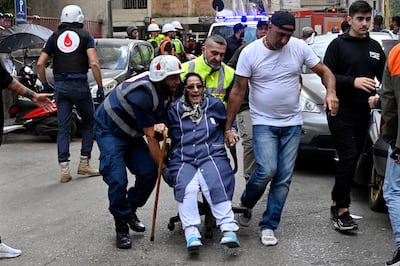Live updates: Follow the latest on Israel-Gaza
An Israeli air strike on Beirut killed Hezbollah media chief Mohammad Afif on Sunday afternoon, two officials said. His death was confirmed by another Hezbollah media official following the strike on Ras Al Nabaa, a rare attack outside of the southern suburbs of Lebanon’s capital, which have come under repeated bombardment.
The attack struck a building of the Arab Socialist Baath party, the leader of the group, Ali Hijazi, said. Mr Hijazi, who was not present, also confirmed Mr Afif’s death. The country's health ministry said the strike killed one and injured three.
Mr Afif was one of the few Hezbollah officials to appear in public in recent weeks and had given a number of press conferences. The National heard the missile whistle for a few seconds before it thudded into the building. The strike hit a neighbourhood where many people displaced from Beirut's southern suburbs by the Israeli bombardment had been seeking refuge. Unlike in other strikes on Beirut's south and other areas of Lebanon, Israel did not give prior warning.
Families, some wearing pyjamas and bathrobes, loitered in the streets nearby, unsure of where to go after leaving their houses during the initial shock. Some sat on the benches of a nearby park attempting to plan their next steps. A father marched grimly holding a newborn baby.
“They’re striking in the middle of Beirut. There‘s nowhere safe to go,” a woman in pyjamas told The National, referencing the strike’s location right next to the Beirut neighbourhood of Ashrafieh, which borders the Ras Al Nabaa neighbourhood. Ashrafieh is in Christian East Beirut while Ras el Nabaa is in Muslim West Beirut. Ashrafieh has been spared from Israeli aggression in past conflicts.

Mr Afif, a civilian, was a well-known figure in the Lebanese media scene. He was also an adviser to longtime Hezbollah leader Hassan Nasrallah, who was killed in September in a massive Israeli air strike in Beirut. Mr Afif was the former director of Al Manar, a TV station backed by Hezbollah.
Elsewhere, Israel attacked the southern suburbs of Beirut multiple times on Sunday morning, flattening numerous residential buildings. The Israeli military released multiple eviction orders shortly beforehand, claiming they were bombing Hezbollah interests. There were no immediate reports of fatalities from the attacks on southern Beirut. Some of the strikes were particularly strong and were felt across Beirut, rattling windows.
More than 3,500 people have been killed by Israeli fire in Lebanon since Hezbollah and the Israeli military began firing over the border at each other in October last year, after the Hamas militant group launched a terror attack on southern Israel that killed 1,200 people and led to over 200 being abducted and taken back to Gaza. The majority of those deaths have occurred in the last eight weeks, when Israel began a ground invasion and significantly stepped up air strikes across Lebanon.
For nearly a week the Lebanese capital has been repeatedly attacked throughout the daytime, leaving no respite for residents. Despite its senior leadership being destroyed, Hezbollah continues to regularly launch rockets deep into Israel while its fighters are engaged in fierce ground battles with invading Israeli soldiers in south Lebanon. The group's attacks have killed at least 76 people, including 31 soldiers. A rocket attack on the northern city of Haifa on Saturday damaged a synagogue and wounded two civilians.
Hezbollah has fired dozens of projectiles into Israel daily and expanded their range to central Israel. The attacks have killed at least 76 people, including 31 soldiers, and caused some 60,000 people to flee.
Also on Sunday, two Lebanese Army soldiers were killed and at least two injured when Israel bombed their position near Hasbaya in south Lebanon. While the Lebanese state does not recognise Israel, the army is not involved in the continuing fighting.
